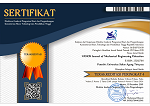Design of Vocational Assistance Management System for Vocational Schools Base on Android Applications
Abstract
The Covid-19 pandemic (corona virus disease-2019) is an acute problem that has a multidimensional impact on all sectors of life, one of which is the education sector. Based on the Decree of the Ministry of Education and Culture (Kemdikbud) through Circular Number 4 of 2020, it decided to postpone all school activities and switch to online learning or distance learning (PJJ). Changes in the learning scheme are considered to have a negative impact on the learning process, especially student learning outcomes. Vocational High School (SMK) students also experience this problem more, which in their learning process prioritizes practice in mastering vocational skills and abilities. As a result, many students experience a decrease in the value of learning outcomes and mastery of the abilities they learn due to minimal or even no direct practical learning experienced by SMK students. Therefore, a solution is needed to support the learning process for vocational students during the Covid-19 pandemic, one of which is through designing a vocational assistance management system (SIMAK SMK) based on an android application. In the development process, research procedures were carried out through literature studies and field studies, then producing media by making flowcharts, then making media according to the design that had been made. The final stage is media evaluation which is validated by educational evaluation experts and educational technology validation experts to see the feasibility of the media and make reports.
Keywords
Full Text:
PDFReferences
Ministry of Education and Culture, “Minister of Education and Culture Regulation Number 4 of 2020 concerning Implementation of Education During the Coronavirus Disease (Covid-19) Emergency Period. Jakarta,” 2020.
United Nations International Children’s Emergency Fund (UNICEF), “Covid-19 The UNICEF stone report revealed that a third of schoolchildren around the world cannot access remote learning while schools are closed. Retrieved September 30, 2022.” https://www.unicef.org/indonesia/id%0A/press-releases/covid-19-report- baru-unicef-mengungkapkan- sekuranga-a third-children-school-di- whole%0A (diakses Sep 30, 2022).
S. Nugraha, T. Sudiatmi, dan M. Suswandari, “Study of the Effects of Online Learning on Class IV Mathematics Learning Outcomes,” J. Res. Innov., vol. 1, no. 3, hal. 265–276, 2020.
T. Handayani, H. Khasanah, dan R. Yoshinta, “Home Study Assistance for Elementary School Students Affected by Covid-19,” ABDIPRAJA (Journal Community Serv., vol. 1, no. 1, hal. 107, 2020.
Kurniasari, Asrilia, F. S. Putro, Putra, dan D. Adi, “No Title,” J. Rev. Pendidik. Dasar J. Kaji. Pendidik. Dan Has. Penelit., vol. 6, no. 3, hal. 246–253, 2020.
R. Syah, “The Impact of Covid-19 on Education in Indonesia: Schools, Skills, and the Learning Process,” SALAM Soc. Cult. J. Syar-I, vol. 7, no. 5, 2020, [Daring]. Tersedia pada: https://doi.org/10.15408/sjsbs.v7i5. 153 14.
R. Maradewa, “KPAI Receives 213 Complaints of Distance Learning, Majority Complain about the Difficulty of Tasks from Teachers,” 2020. .
R. M. Branch, Instructional Design: The ADDIE Approach. New York: Springer Science & Business Media, 2015.
Emzir, Educational Research Methodology; Quantitative and Qualitative. Jakarta: PT Raja Grafindo Persada, 2013.
DOI: http://dx.doi.org/10.30870/vanos.v7i2.17785
Refbacks
- There are currently no refbacks.

This work is licensed under a Creative Commons Attribution 4.0 International License.


.png)
.png)
